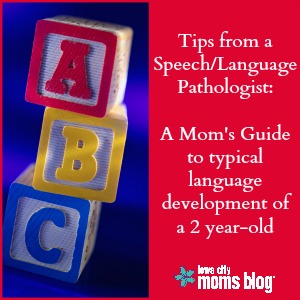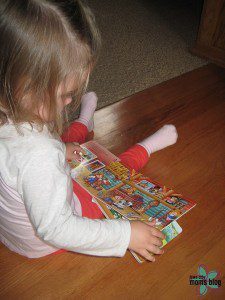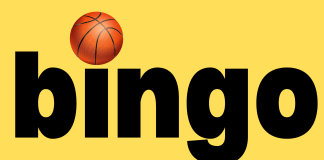As I’ve mentioned a time or two in previous posts, I’m a pediatric speech-language pathologist. While I am no expert in speech and language, I make judgement calls each day/week on whether or not kiddos could use some extra assistance to aid in their development. On top of that, I have come to notice that I now have more friends who ask for advice, especially as our littles are becoming more talkative.
I am the first to admit that I sometimes forget that not everyone has the same knowledge as I do. That is, I am at times surprised at some of the questions I am asked. I mean, of course it is OK that your four-year-old cannot say /r/, and it is not concerning that your cutie three-year-old calls a “shovel” a “shobel”. I then remind myself to take a step back and realize that these questions are excellent and come from a place of love and concern, and I welcome the chance to answer them.
I decided it may be helpful for readers if I wrote up ROUGH GUIDELINES to speech and language development. While I will be referencing a source that I often look to when at work, I do not claim that these milestones are 100% fact or all encompassing. My intent is that I can offer you an idea of what your child should be doing/saying around a given age. Is it possible your child’s skills were a bit different? Sure! Should you worry if your child is not doing some of these things? Possibly, but not necessarily. This is my subtle way of saying that I am wanting to provide you with information, but you certainly know your child best and can be the best judge of your child’s development!
Because I could speak on this topic for quite some time (and no one wants to read that!), I will be doing a series of posts highlighting language development for children ages 2 through 5. In this first post I will address speech and language of a two-year-old. Please note that I will make some comments on development between the ages of two and three, but in general I will be discussing the typical child around the age of 24 months. Here goes…
Speech Sound Development
By the age of two, your child should have developed the following sounds:
- p, b, m, n, w, h
Between the ages of two and three, your child will likely develop the following:
- k, g, t, d, ng
It is probable that your child will make many errors (Who hasn’t giggled at a toddler playing with a “titty tat” instead of a “kitty cat”?), but nonetheless, a typical kid around the age of two will be able to make these sounds in some context. It is expected that your 24-month-old will be about 50% intelligible, meaning that you can understand around 50% of what he/she says.
Comprehension
By the age of two, your child should understand/do the following:
- comprehends relatively simple concepts like on, off, in, up, down
- answers basic yes/no questions (e.g. Do you want milk?)
- follows one-step directions (e.g Get your shoes) and some two-step directions (e.g. Get your shoes and bring them here)
- points to named pictures in books
- comprehends basic questions (e.g. “Where is Mommy?”)
Expression
By the age of two, your child will likely:
- have at least 200-300 words
- ask simple questions (e.g. What’s this?)
- refer to self by name
- use social words like “hi”, “bye”, “please”
- point to and label pictures in books
- use two-word combinations
- use intonation similar to an adult, such as when asking questions
- use pronouns “I” and “it”
- mark at least some verbs with -ing (e.g. crying, running)
*Portions of the above lists come from Linguisystems: Guide to Communication Milestones, 2012 Edition.
I imagine that many of you are looking at these lists and thinking, “Check, check, hmmmm…Does she do that? Yep, check.” Please do not worry too much if you find that some of these milestones have not necessarily been met by your 24-month-old kiddo. These are guidelines, and it is possible that what your child is not doing now he/she will do a month from now. One red flag I do want to mention involves vocabulary. If you realize that your two-year-old has 50 words or less or seems to be losing words, please consider looking into scheduling a speech-language evaluation! SLPs exist to help, so don’t hesitate to ask for it!













Visiting from New Orleans MB….Thank you for this great guide. This gives me great information about my 23 monther, and some goals for things to practice.
Lana,
Thank you for the post. I just had my daughter who is 20 months old at the pediatrician today and she states that we need to take my daughter to a speech pathologist (which we are). However, due to the lack of funding in the state it is going to be 3 weeks until we get an appointment. Our daughter is fluent in gibberish but only has about 5 words that she says consistently. She also used to say more words prior to chronic ear infections and tubes put in late May. What activities should I try to do with my daughter until the appointment? My husband and I are very concerned.
Thank you,
Concerned parents
This is so awesome!! Thank you for writing this! I’ve been looking for something to clarify more what I can aim for with my kiddo. It’s super helpful to know what sounds he will most likely be able to make.